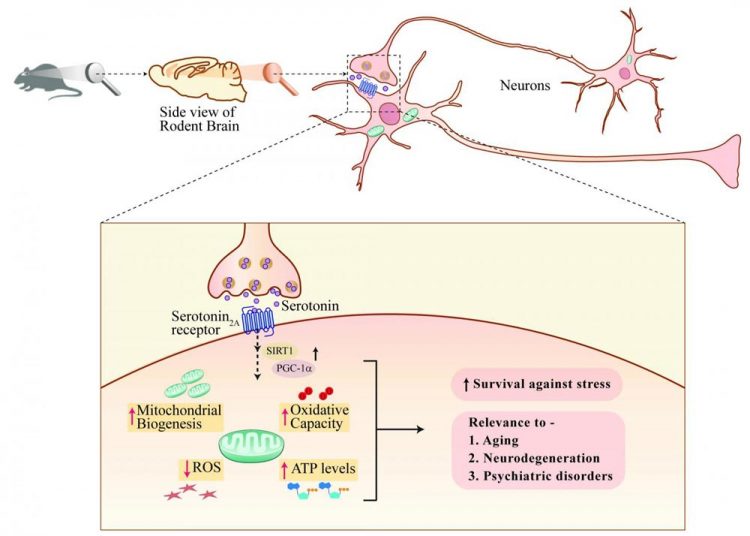Serotonin boosts neuronal powerplants protecting against stress

This is serotonin action on neuronal mitochondria. Credit: Vidita A. Vaidya and Ullas Kolthur-Seetharam
Collaborative research by Prof. Vidita Vaidya and Prof. Ullas Kolthur-Seetharam groups at TIFR, along with Dr. Ashok Vaidya, at Medical Research Centre, Kasturba Health Society, has demonstrated an unusual function for the neurotransmitter serotonin, in the generation of new mitochondria–a process called mitochondrial biogenesis–in neurons, accompanied by increase in cellular respiration and ATP, the energy currency of the cell.
These effects of serotonin involve the serotonin2A receptor and master regulators of mitochondrial biogenesis, SIRT1 and PGC-1α. Serotonin reduces toxic reactive oxygen species in neurons, boosts anti-oxidant enzymes and buffers neurons from the damaging effects of cellular stress.
This study (Fanibunda et al., 2019), appearing in the international journal PNAS, uncovers an unprecedented role for serotonin in energy production in neurons directly impacting how neurons handle stress.
Mitochondrial function in neurons is vital in determining how neurons cope with stress and the trajectory of aging.
This work provides exciting evidence that the neurotransmitter serotonin can directly influence neuronal powerplants, thus impacting the manner in which neurons grapple with stress.
This work identifies novel drug targets for treating mitochondrial dysfunction in neurons, with therapeutic potential for neurodegenerative and psychiatric disorders.
Media Contact
More Information:
http://dx.doi.org/10.1073/pnas.1821332116All latest news from the category: Life Sciences and Chemistry
Articles and reports from the Life Sciences and chemistry area deal with applied and basic research into modern biology, chemistry and human medicine.
Valuable information can be found on a range of life sciences fields including bacteriology, biochemistry, bionics, bioinformatics, biophysics, biotechnology, genetics, geobotany, human biology, marine biology, microbiology, molecular biology, cellular biology, zoology, bioinorganic chemistry, microchemistry and environmental chemistry.
Newest articles

Recovering phosphorus from sewage sludge ash
Chemical and heat treatment of sewage sludge can recover phosphorus in a process that could help address the problem of diminishing supplies of phosphorus ores. Valuable supplies of phosphorus could…

Efficient, sustainable and cost-effective hybrid energy storage system for modern power grids
EU project HyFlow: Over three years of research, the consortium of the EU project HyFlow has successfully developed a highly efficient, sustainable, and cost-effective hybrid energy storage system (HESS) that…

After 25 years, researchers uncover genetic cause of rare neurological disease
Some families call it a trial of faith. Others just call it a curse. The progressive neurological disease known as spinocerebellar ataxia 4 (SCA4) is a rare condition, but its…





















